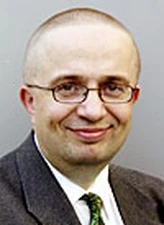Markku Kulmala

The 2007 Vilhelm Bjerknes Medal is awarded to Markku Kulmala for his outstanding contributions to aerosol science (formation and growth mechanisms and aerosol-cloud-climate interactions) and to the creation of a new discipline, terrestrial ecosystem meteorology.
Markku Kulmala, Professor and Head of the Division of Atmospheric Sciences at the University of Helsinki, is a world leader in aerosol science and a founder of “terrestrial ecosystem meteorology” (an interdisciplinary field of research within meteorology and biology addressing atmosphere-ecosystem interactions). His work covers theoretical and experimental physics, theoretical and observational meteorology and biophysics. He has published more than 300 papers in peer-reviewed journals, not to mention his supervision, educational, and organizational activities. His world-renowned research addresses the following key topics:
- Formation and growth mechanisms of atmospheric aerosols and aerosol dynamics (e.g., Nature, 404, 66, 2000; Science 302, 1000, 2003; Science, 307, 698, 2005);
- The effect of secondary biogenic aerosols on global aerosol load (e.g., Nature, 416, 497, 2002; Nature, 417, 632, 2002; Nature, 433, E13, 2005);
- Aerosol-cloud-climate interaction (e.g., Nature 388, 336, 1997; Science, 292, 2026, 2001);
- The relationships between the atmosphere and different ecosystems, particularly boreal forest (e.g., Nature, 422, 134, 2003; Science 312, 261, 2006).
His approach starts from basic nucleation theories followed by aerosol dynamic / atmospheric chemistry models and laboratory experiments and ends in broad-ranging field measurements (in particular at the University of Helsinki research stations) and 3D modeling. His interdisciplinary research has been complemented by the creation of an interdisciplinary team and the use of a wide range of modern scientific technologies, including analysis of satellite data together with point measurements and 3D-models. A combination of personal fundamental research and leadership in large collective projects has allowed Markku Kulmala to considerably advance our knowledge of biosphere – aerosol – cloud – climate interactions.
